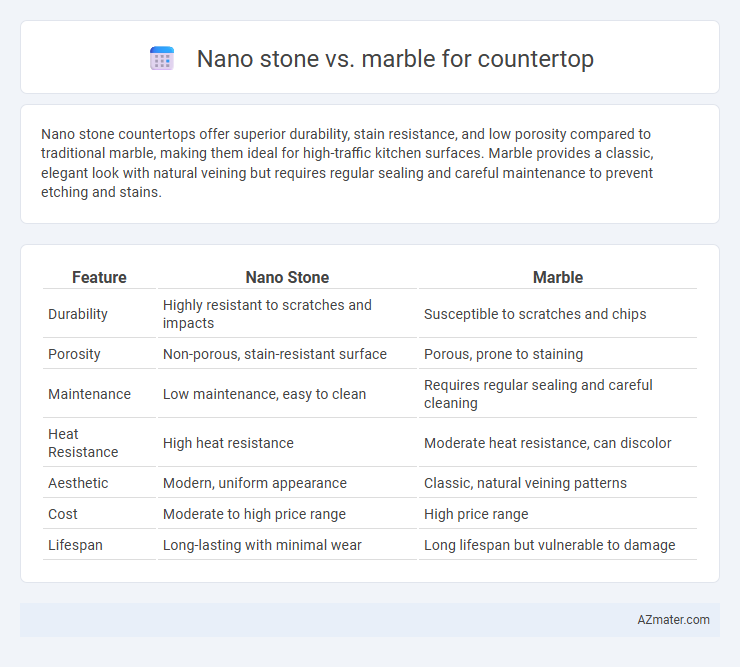Nano stone countertops offer superior durability, stain resistance, and low porosity compared to traditional marble, making them ideal for high-traffic kitchen surfaces. Marble provides a classic, elegant look with natural veining but requires regular sealing and careful maintenance to prevent etching and stains.
Table of Comparison
| Feature | Nano Stone | Marble |
|---|---|---|
| Durability | Highly resistant to scratches and impacts | Susceptible to scratches and chips |
| Porosity | Non-porous, stain-resistant surface | Porous, prone to staining |
| Maintenance | Low maintenance, easy to clean | Requires regular sealing and careful cleaning |
| Heat Resistance | High heat resistance | Moderate heat resistance, can discolor |
| Aesthetic | Modern, uniform appearance | Classic, natural veining patterns |
| Cost | Moderate to high price range | High price range |
| Lifespan | Long-lasting with minimal wear | Long lifespan but vulnerable to damage |
Introduction to Nano Stone and Marble Countertops
Nano stone countertops offer exceptional durability and resistance to scratches, stains, and heat due to their engineered composition of natural minerals and advanced resin technology. Marble countertops, prized for their timeless elegance and unique veining patterns, provide a luxurious and natural aesthetic but require regular sealing to prevent staining and etching. Choosing between nano stone and marble depends on balancing the desire for low maintenance and high durability with classic beauty and natural variation.
Composition and Manufacturing Process
Nano stone countertops are engineered from a blend of natural quartz, resin, and nanoparticles, resulting in a highly durable and non-porous surface that resists stains and scratches. Marble, a natural metamorphic rock composed primarily of calcite or dolomite, undergoes quarrying and cutting without extensive alteration, which makes it more porous and prone to etching and staining. The manufacturing process for nano stone involves advanced technology that ensures uniformity and enhanced physical properties, while marble retains its natural variations and requires sealing to maintain longevity.
Aesthetic Differences: Nano Stone vs Marble
Nano stone countertops offer a consistent, uniform appearance with a sleek, modern finish that resists stains and scratches, making them ideal for contemporary kitchen designs. Marble showcases unique veining patterns and rich natural textures that vary with each slab, providing a timeless, luxurious aesthetic favored in classic and elegant interiors. The choice between nano stone and marble hinges on whether homeowners prioritize durability and uniformity or the natural, artistic variations inherent in marble surfaces.
Durability and Strength Comparison
Nano stone countertops exhibit superior durability and strength compared to marble, boasting high resistance to scratches, impacts, and heat. The composite nature of nano stone, often comprising quartz and resins, ensures minimal porosity, reducing the risk of cracks and chips that commonly affect marble surfaces. Marble, although aesthetically appealing, is softer and more prone to etching and staining due to its calcium carbonate composition, making nano stone a more resilient choice for high-traffic kitchen environments.
Stain and Scratch Resistance
Nano stone countertops offer superior stain and scratch resistance compared to marble due to their dense, non-porous surface that prevents liquid absorption and surface damage. Marble, while elegant, is more porous and prone to etching from acidic substances, making it susceptible to stains and scratches over time. For kitchens or high-traffic areas, nano stone provides a durable, low-maintenance option that maintains its appearance with minimal care.
Maintenance and Cleaning Requirements
Nano stone countertops feature non-porous surfaces that resist stains and bacteria, making maintenance simple with just mild soap and water. Marble requires more frequent sealing to protect against stains and etching from acidic substances, demanding careful cleaning with pH-neutral products. Nano stone's durability and low upkeep provide a more practical option for busy kitchens compared to marble's sensitivity and higher maintenance needs.
Cost Analysis: Nano Stone vs Marble
Nano stone countertops typically cost between $50 and $70 per square foot, offering a more budget-friendly option compared to marble which ranges from $75 to $150 per square foot due to its natural veining and rarity. Installation expenses for nano stone are generally lower because of its lighter weight and easier cutting process, reducing labor costs. Maintenance costs also favor nano stone, as it is more stain-resistant and requires less frequent sealing compared to the porous nature of marble.
Environmental Impact and Sustainability
Nano stone countertops offer a significantly lower environmental impact compared to marble due to their use of synthetic materials and energy-efficient manufacturing processes that reduce resource depletion and waste. Marble extraction involves extensive quarrying, which leads to habitat destruction, high carbon emissions, and considerable water consumption, making it less sustainable over its lifecycle. Choosing nano stone supports eco-friendly construction by minimizing natural resource extraction and promoting recyclable and durable surfaces.
Popular Applications in Modern Kitchens
Nano stone countertops offer exceptional durability and resistance to stains and scratches, making them ideal for high-traffic modern kitchens that prioritize low maintenance and long-lasting surfaces. Marble countertops remain popular for their timeless elegance and natural veining, often chosen for kitchen islands and backsplashes where aesthetic appeal is paramount. Both materials are widely used in contemporary kitchen designs, with nano stone favored for practicality and marble preferred for luxury.
Choosing the Right Countertop: Nano Stone or Marble?
Nano stone countertops offer superior durability and stain resistance compared to marble, making them ideal for high-traffic kitchens. Marble countertops provide timeless elegance with unique veining but require regular sealing and careful maintenance to prevent etching and staining. Choosing between nano stone and marble depends on balancing aesthetic preferences with practical considerations like durability and upkeep.

Infographic: Nano stone vs Marble for Countertop
 azmater.com
azmater.com